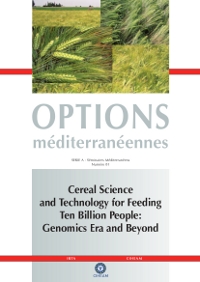| p. 19-24 | Article suivant |
Reevaluation of the use of multilocus markers to study crop origins
Crop origins are the subject of extensive debate, in particular with regards to the number and locality of the underlying domestication events. Multilocus studies using AFLPs or microsatellites have consistently inferred single origins for crops based on the monophyletic phylogenies of the domesticated varieties. Yet phylogenetic evidence from individual genetic loci suggests multiple origins for some of these crops. We have carried out simulations of crop domestication in which the behaviour of genome-wide multilocus systems are studied. We find that there is a tendency for multilocus analysis to assign a single origin to a crop even when that crop derives from multiple domestications. Indeed, crops that have multiple origins are actually more likely to give rise to a monophyletic phylogeny than those that have a single origin. Our results indicate that the probability of monophyly is largely dependent upon the size and age of the domesticate population, which means that multilocus systems can be used to establish the upper limit to the number of plants originally brought into cultivation.
- [ Afficher ]
- [ Télécharger ]
- [ Exporter la citation ]
Vous pouvez télécharger la citation au format :
- [ Imprimer ]
-
Mots-clés
DOMESTICATION, MARQUEUR GENETIQUE, PHYLOGENIE, PLANTE DE CULTURE, PROVENANCE, SIMULATIONCiter cet article
Brown T.A., Allaby R.G. Reevaluation of the use of multilocus markers to study crop origins. In : Molina-Cano J.L. (ed.), Christou P. (ed.), Graner A. (ed.), Hammer K. (ed.), Jouve N. (ed.), Keller B. (ed.), Lasa J.M. (ed.), Powell W. (ed.), Royo C. (ed.), Shewry P. (ed.), Stanca A.M. (ed.). Cereal science and technology for feeding ten billion people: genomics era and beyond. Zaragoza : CIHEAM / IRTA, 2008. p. 19-24. (Options Méditerranéennes : Série A. Séminaires Méditerranéens; n. 81). Meeting of the Eucarpia Cereal Section, 2006/11/13-17, Lleida (Spain). http://om.ciheam.org/om/pdf/a81/00800794.pdf



